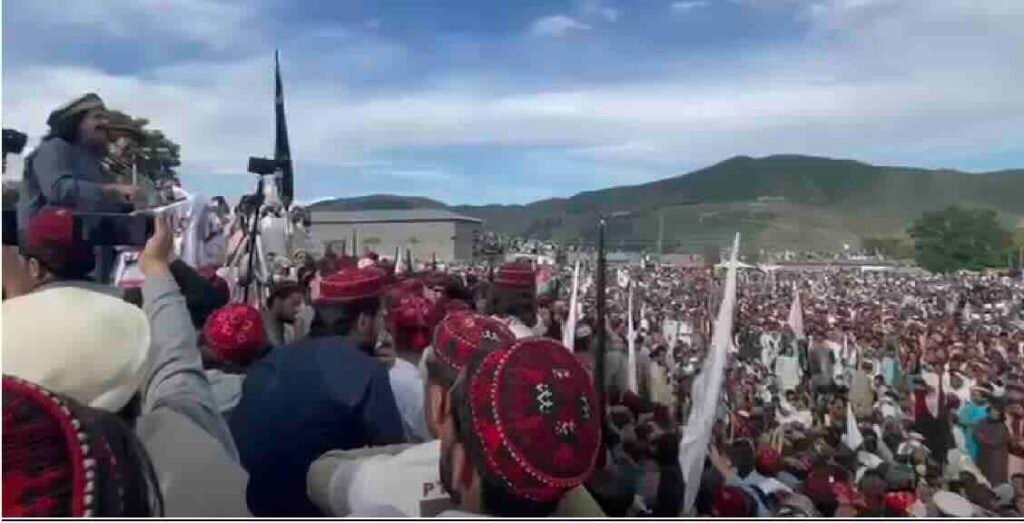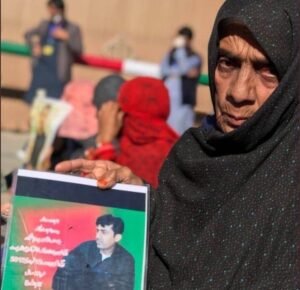PTM’s Campaign Against Systematic Oppression

By Kadeem Baloch
The Pashtun Tahaffuz Movement (PTM) recently held a significant gathering in Miranshah, North Waziristan, to protest against the ongoing atrocities committed by the Pakistani government against the Pashtun community. The PTM, a rights group advocating for Pashtun rights since 2018, has been vocal about the extrajudicial killings, enforced disappearances, and unlawful detentions that have plagued the Pashtun-majority areas for years.
On Sunday, PTM members and supporters converged in Miranshah, calling for an end to these human rights abuses. Afrasiab Khattak, a former member of the Senate of Pakistan, highlighted the importance of the PTM’s resistance against state repression. He noted that the PTM is a trailblazer in opposing the war imposed on both sides of the Durand Line, a sentiment echoed by many in the movement. Khattak also expressed relief that other political parties are beginning to recognize and address the real perpetrators of these injustices.
Khor Bibi, a human rights activist and PTM supporter, emphasized the scale of the protest, noting that thousands of Pashtuns gathered from all over Pashtunkhwa to stand against state brutality. This large turnout reflects the deep-seated grievances and the widespread support for the PTM’s cause among the Pashtun community.
Addressing the gathering, PTM leader Mohsin Dawar criticized Hizb-e-Islami leader Gulbuddin Hekmatyar’s recent stance on the Afghan peace process. Dawar condemned Pakistan for providing state protocol to Hekmatyar, who has threatened Afghanistan from Pakistani soil. He stressed that only Afghans have the right to decide their future and that the PTM will resist any external attempts to influence Afghan decisions.
The PTM has consistently called for the de-mining of former tribal areas and greater freedom of movement within these regions. The group’s demands also include ending extrajudicial killings, enforced disappearances, and unlawful detentions. PTM members report that at least 30,000 people from Khyber Pakhtunkhwa and Baluchistan have gone missing over the past decade, a staggering figure that underscores the severity of the situation.
In addition to the Miranshah gathering, the PTM also held another major event in Razmak, North Waziristan, drawing participants from across Khyber Pakhtunkhwa. This gathering brought to spotlight various issues affecting the Pashtun community, such as the persistent threats of land mines, bombings, and economic exploitation by what the PTM describes as the “dollar mafia.” The movement also raised the target killings and forced disappearances, urging both national and international communities to take notice and act.
The PTM’s emergence was catalyzed by the extrajudicial killing of Naqeebullah Mehsud, a Pashtun youth, by former police officer DSP Rao Anwar in Karachi. This incident, along with allegations of over 400 Pashtuns killed in staged encounters in Karachi, ignited widespread protests and led to the formation of the PTM. Since then, the movement has been at the forefront of advocating for the rights and protection of Pashtuns.
The recent protests in Miranshah and Razmak reflect the ongoing struggle of the Pashtun community against state oppression and human rights violations. The PTM aims to use these platforms to bring their concerns to the forefront, hoping to effect change and improve the lives of Pashtuns across Pakistan. By drawing national and international attention to these issues, the PTM continues its fight for justice and equality for the Pashtun people.
The author chooses a pseudonym. Kadeem Baloch is a freelance journalist based in Pakistan.
Note: The contents of the article are of sole responsibility of the author. Afghan Diaspora Network will not be responsible for any inaccurate or incorrect statement in the articles.











